The Historiographical Development of the Concept “mfecane” and ...
The Historiographical Development of the Concept “mfecane” and ...
The Historiographical Development of the Concept “mfecane” and ...
You also want an ePaper? Increase the reach of your titles
YUMPU automatically turns print PDFs into web optimized ePapers that Google loves.
worse for Africans than no civilization at all, became topical in European<br />
writings in <strong>the</strong> first third <strong>of</strong> <strong>the</strong> twentieth century. <strong>The</strong> third period saw <strong>the</strong><br />
introduction <strong>of</strong> British rule <strong>and</strong> Christianity as <strong>the</strong> means to counter barbarism,<br />
with Africans being taught <strong>the</strong> full meaning <strong>of</strong> civilization. Shepstone used this<br />
view <strong>of</strong> <strong>the</strong> African past as a means <strong>of</strong> legitimising <strong>the</strong> colonisation <strong>of</strong> Natal in<br />
general, <strong>and</strong> <strong>the</strong> paternalistic Shepstone system <strong>of</strong> administering Natal Africans<br />
in particular. He preferred <strong>the</strong> ‘simple, primitive, unalloyed barbarism’ <strong>of</strong> <strong>the</strong><br />
Natal Africans to <strong>the</strong> ‘barbarism [with] a dash <strong>of</strong> civilization’ <strong>of</strong> those Africans<br />
that had been instructed by missionaries or who had received a school<br />
education. 88 This tripartite structure <strong>of</strong> <strong>the</strong> history <strong>of</strong> Natal <strong>and</strong> Zulul<strong>and</strong> was<br />
widely espoused in later historical literature, <strong>and</strong> was applied to <strong>the</strong> mfecane<br />
narrative not only <strong>of</strong> <strong>the</strong> eastern seaboard area but in <strong>the</strong> whole <strong>of</strong> sou<strong>the</strong>rn<br />
Africa. 89<br />
Also in this article was Shepstone’s version <strong>of</strong> Dingiswayo’s return to <strong>the</strong><br />
M<strong>the</strong>thwa state after his exile. Shooter had him arriving with a mounted<br />
European, but Shepstone had him returning by himself on a horse in 1792. It<br />
seems that Shepstone was also not able to conceive <strong>of</strong> an African chief<br />
introducing military innovations without European influence. 90 Both versions<br />
have been repeated in subsequent writings. As already mentioned, <strong>the</strong> 1875<br />
article st<strong>and</strong>s in contradiction to ‘Inhabitants’ <strong>and</strong> ‘Historic Sketch’ by laying <strong>the</strong><br />
blame for <strong>the</strong> depopulation <strong>of</strong> Natal at <strong>the</strong> doors <strong>of</strong> <strong>the</strong> Zulu state alone.<br />
Shepstone’s description <strong>of</strong> Shaka’s state-building also failed to include <strong>the</strong><br />
information that only <strong>the</strong> ruling elite <strong>of</strong> <strong>the</strong> defeated chiefdoms were<br />
exterminated. It is clear that Shepstone chose to discard this sub-discourse <strong>and</strong><br />
emphasise only <strong>the</strong> dominant discourse in this prominently published article. As<br />
it was generally accepted in Natal that Shepstone had a great knowledge <strong>of</strong> “<strong>the</strong><br />
88 Ibid., 97-99, 102-4. Hamilton, Terrific Majesty, 88-89.<br />
89 W.T. Brownlee, Reminiscences <strong>of</strong> Kafir Life <strong>and</strong> History <strong>and</strong> O<strong>the</strong>r Papers <strong>of</strong> <strong>the</strong> Late Hon.<br />
Charles Brownlee, Gaika Commissioner (Lovedale, 1896), 81-83. J. A. Farrer, Zulul<strong>and</strong> <strong>and</strong> <strong>the</strong><br />
Zulus (London, 1879), 14-15. J. Bird, 'Introductionary Remarks on <strong>the</strong> Compilation <strong>of</strong> <strong>the</strong> Annals<br />
<strong>of</strong> Natal', in Bird, Annals <strong>of</strong> Natal, I, 5-7.<br />
90 Shepstone, '<strong>The</strong> Zulus', 95-96, 99-102, 104. See also A. Koopman, 'Dingiswayo Rides Again',<br />
Journal <strong>of</strong> Natal <strong>and</strong> Zulu History, 2 (1979), 1-12.<br />
99

















